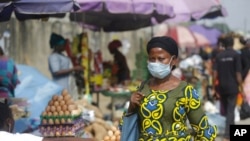Nigerian officials say the country is ready to receive its first COVID-19 vaccine doses by the end of January. The government wants to vaccinate 40% of the country's population by the end of this year. But experts say the cost and storage of the vaccine poses a challenge.
Officials said President Muhammadu Buhari and Vice President Yemi Osinbajo would be the first recipients of the Pfizer coronavirus vaccine, the first 100,000 doses of which are expected to be available this month.
They said the vaccine then would be distributed to key political leaders and health workers in order to raise awareness before it gets to the citizens.
Faisal Shuaib, executive director of the National Primary Health Care Development Agency, said,
"We have actually developed a comprehensive deployment plan on how we are going to deploy these vaccines in phases. We're aiming to cover up to 70% of the population just to ensure that we're able to stop transmission."
Shuaib said 40% of the population was expected to get shots this year and the remaining 30% by the end of next year.
Lacking storage
But experts said Nigeria does not have adequate storage facilities to hold vaccines at the required temperature of minus 70 degrees Celsius.
Also, the demand and cost for vaccines are very high, making it nearly impossible to accommodate that many doses anytime soon in Nigeria, according to pharmaceutical research expert Olobayo Kunle.
"A number of our colleagues, scientists in this country have worked hard, but one thing is for sure: The vaccines that are in use, we were not directly involved in the development," Kunle said. "So, sitting here and developing timelines is a bit difficult."
Many African countries are facing the challenge of securing adequate supplies of the coronavirus vaccine because of the high cost. But the World Health Organization-backed COVAX program is making sure countries like Nigeria are not left behind, Shuaib said.
"There's been a preponderance of vaccines going to the richer countries," Shuaib said, "so what the COVAX facility is trying to do is to make sure that vaccines are available to low- and medium-income countries irrespective of their abilities to pay. For example, they're going to be providing up to 20% of Nigeria's population in terms of needs for vaccine free of charge."
Nigerian authorities are also bargaining with vaccine manufacturers in Britain, Russia and China and say they would prefer vaccines that are easy to store and deliver.




